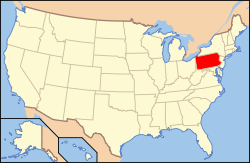
Alcohol laws of Pennsylvania
Encyclopedia

Pennsylvania
The Commonwealth of Pennsylvania is a U.S. state that is located in the Northeastern and Mid-Atlantic regions of the United States. The state borders Delaware and Maryland to the south, West Virginia to the southwest, Ohio to the west, New York and Ontario, Canada, to the north, and New Jersey to...
are some of the most restrictive in the United States of America, and contain many peculiarities not found in other states.
For consumption off-premises
Pennsylvania is an alcoholic beverage control stateAlcoholic beverage control state
Alcoholic beverage control states, generally called control states, are those in the United States that have state monopoly over the wholesaling and/or retailing of some or all categories of alcoholic beverages, such as beer, wine, and distilled spirits....
. Wines and spirits are to be sold only in the state owned Wine And Spirits
Pennsylvania Liquor Control Board
The Pennsylvania Liquor Control Board is an independent government agency that manages the beverage alcohol industry in Pennsylvania. It is responsible for licensing the possession, sale, storage, transportation, importation, and manufacture of wine, spirits, and malt or brewed beverages in the...
shops, where all prices must remain the same throughout the state (county sales tax may cause the price to differ slightly). People under the age of 21 are prohibited from entering Wine and Spirits shops, unless accompanied by a guardian. The standard business hours for these stores are 9am to 9pm Monday through Saturday with only a hand full of stores open to 10pm such as Franklin Mills or Columbus Blvd. 9:30pm. Previously, all state-controlled stores were closed on Sundays, but now certain locations are open for limited hours. Stores with Sunday hours are 12pm to 5pm no exceptions. Searches for store locations, hours and phone numbers are available on the PLCB web site. Wineries are common throughout the commonwealth, and often sell their wines at storefronts in shopping malls. Wine was available for a short time in supermarket kiosks, but this practice has ended.
Beer may only be purchased from a restaurant, bar, licensed beer store, or distributor. Beer distributors mainly sell cases and kegs of beer, not smaller volumes of beer such as six packs. Six and twelve packs, along with individual bottles such as 40 ounce or 24 ounce beers, are sold at bars, restaurants, and licensed retailers. A consumer is limited to 192 ounces of beer per purchase. For larger quantities one must go to a beverage distributor which sells beer only by the case or keg. Beverage distributors (which also sell soft drinks) may sell beer and malt liquor, but not wine or hard liquor. Unlike the Wine and Spirits shops, people under 21 may enter most beverage distributors without an adult, subject to the rules of the individual establishment.
Some supermarkets, including Wegmans
Wegmans Food Markets
Wegmans Food Markets, Inc. is a family-owned U.S. regional supermarket chain headquartered in Gates, New York, near Rochester. Wegmans has more than 75 stores spread across the mid-Atlantic region, in New York, Pennsylvania, New Jersey, Virginia, Maryland and Massachusetts...
, Giant Eagle
Giant Eagle
Giant Eagle, Inc., is a supermarket chain with stores in the U.S. states of Pennsylvania, Ohio, West Virginia, and Maryland. The company was founded in 1918 in Pittsburgh, Pennsylvania. Supermarket News ranked Giant Eagle No. 21 in the 2009 "Top 75 North American Food Retailers" based on 2008...
, and Weis
Weis Markets
Weis Markets, Inc. is a chain of supermarkets based in Sunbury, Pennsylvania, with a presence in Pennsylvania, New York, New Jersey, West Virginia, and Maryland. In 2011, it operates 162 stores in five states.-History:...
, have begun to sell alcohol within restaurants attached to the main supermarket building, but only under very specific conditions (the restaurant must have a defined separation from the rest of the supermarket, a separate cashier, and seating for at least 30 patrons). Supermarket chain ShopRite
ShopRite (United States)
ShopRite Supermarkets is a retailers' cooperative chain of supermarkets in the northeastern United States, with stores in New Jersey, New York, Connecticut, Delaware, Maryland, and Pennsylvania...
has begun to attach Wine and Spirits stores to its stores. For a time, Sheetz
Sheetz
Sheetz, Inc. is a chain of gas stations/convenience stores owned by the Sheetz family. Stores are located in Maryland, North Carolina, Ohio, Pennsylvania, Virginia, and West Virginia....
obtained a liquor license for a restaurant attached to one of its convenience stores in Altoona
Altoona, Pennsylvania
-History:A major railroad town, Altoona was founded by the Pennsylvania Railroad in 1849 as the site for a shop complex. Altoona was incorporated as a borough on February 6, 1854, and as a city under legislation approved on April 3, 1867, and February 8, 1868...
. After several debates, the Supreme Court of Pennsylvania
Supreme Court of Pennsylvania
The Supreme Court of Pennsylvania is the court of last resort for the Commonwealth of Pennsylvania. It meets in Philadelphia, Pittsburgh, and Harrisburg, Pennsylvania.-History:...
ruled that the store must sell beer to in-house customers as well as take-out. The 17th Street store now again sells beer and allows limited in store consumption.

